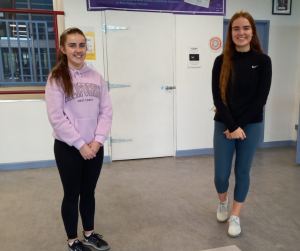 Earlier this year Donegal TD Thomas Pringle introduced a bill to Dáil Éireann calling for a referendum on lowering the voting age in Ireland to 16. As part of the preparation for this bill he consulted with the Student Council in our Killybegs school, St Catherine’s Vocational School. In this blog two representatives of the Student Council, Emma Cunningham (Fifth Year, pictured left) and Nicole McGinty (Transition Year, pictured right), tell us about this consultation and the pros and cons of lowering the voting age.
Earlier this year Donegal TD Thomas Pringle introduced a bill to Dáil Éireann calling for a referendum on lowering the voting age in Ireland to 16. As part of the preparation for this bill he consulted with the Student Council in our Killybegs school, St Catherine’s Vocational School. In this blog two representatives of the Student Council, Emma Cunningham (Fifth Year, pictured left) and Nicole McGinty (Transition Year, pictured right), tell us about this consultation and the pros and cons of lowering the voting age.
In May Donegal T.D. Thomas Pringle introduced a bill calling for a referendum on lowering the voting age in Ireland. At the time he said: “I am introducing this bill on Thursday to coincide with the Scottish and Welsh elections, in which 16 and 17 year olds are voting.” Deputy Pringle noted that in March of 2013, the first report on the Convention on the Constitution examined this issue and the majority recommended that the voting age should be lowered to 16 years old and that the franchise should be extended for all elections. He said “My bill would put the question to the people of Ireland on whether or not they agree to amend Article 16 of the Constitution, reducing the age eligibility to vote in Dáil elections down from 18 years of age to 16 years of age. This change, if accepted by the people, would mean that people could register to vote from the age of 16 years old and be allowed to vote in all elections, including referendums.”
In early May Thomas Pringle discussed the issues with our Student Council. We discussed how many teenagers are a lot more involved in society than many people think. Many 16-17 year olds have a part-time job and pay tax but have no say on how the tax is spent. We also discussed how the decisions being made do affect young people more than people think. Below we have stated some arguments for and some arguments against this bill.
For:
First of all, if you look back at the drop-out rates of older generations, you can see that many people dropped out of school during their teenage years, missing out on the vital parts of their education. Nowadays, the dropout rates are definitely not as high as they were in the past, meaning that teenagers are more educated and ready to vote in referendums. We also spoke about the fact that if the voting age was lowered, many young people would become interested and more involved in today’s society and topics. This was another important reason when talking about this bill. We didn’t think that teenagers would be interested in voting and learning about what goes on in the world, but when the voting option is there, teenagers would become more invested in learning about elections and referendums in today’s world.
Against:
We also spoke about the negative effects that lowering the voting age would have on society. For example, the maturity of young people was a major con when talking about the topic. Although we are in school and learning about life, there are still a lot of things teenagers are uneducated on, especially things to do with law and politics. We also spoke about the fact that the voting number of young adults in their early 20s has been very low in previous referendums and it is suggested that people aren’t ready to vote until later in life. In general, many of the older generations simply just don’t see the need to lower the voting age. People think that teenagers are still growing, developing and learning about life and are too young and immature to vote.
These points merely touch on the debate and we would encourage everyone to become informed and develop their opinions.
